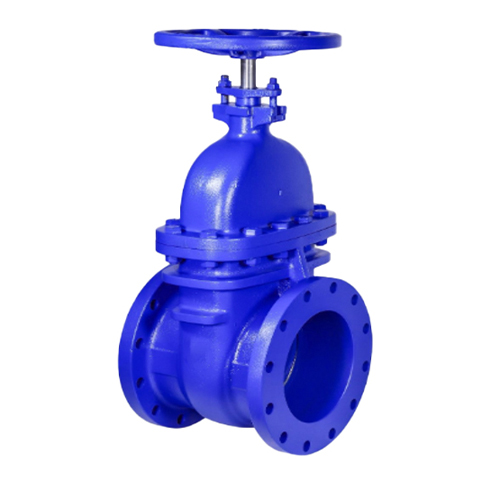In the world of industrial fluid control, selecting the right valve can significantly impact efficiency, safety, and long-term operational costs. Gate valves are essential components in many systems, offering reliable and efficient performance for controlling fluid flow. Whether you are managing water systems, oil pipelines, or chemical processing, understanding the features and benefits of gate valves can guide your purchasing decisions. In this article, we’ll explore how gate valves work, their advantages, limitations, and applications across various industries, helping you make informed choices when purchasing industrial gate valves.
Working Principle of Gate Valves
Gate valves operate through a simple mechanism: a gate moves vertically to open or close the flow of fluid. When the gate is raised, it allows fluid to flow freely; when lowered, it creates a seal, cutting off the flow. This straightforward design makes gate valves highly effective for applications where full flow or complete shut-off is required.
Why it matters for you:
The low flow resistance of gate valves makes them ideal for high-volume fluid control in systems that demand minimal disruption. Whether you’re looking for high-flow gate valves or a reliable solution for controlling water flow, their simple mechanism ensures efficiency in a variety of industries.
Advantages of Gate Valves
- Low Flow Resistance: The straight-through flow path reduces turbulence, making gate valves perfect for high-flow systems.
- Effortless Operation: The vertical movement of the gate requires less force, making them easier to operate compared to other valves, even in heavy-duty applications.
- Bidirectional Flow: Gate valves support fluid flow in both directions, which offers greater flexibility when designing piping systems.
- Durability: Constructed from materials like stainless steel and alloyed metals, gate valves are known for their long-lasting durability and wear resistance.
Why it matters for you:
If you’re in the market for durable industrial valves that can handle high-volume fluid applications, gate valves are your go-to solution. Their corrosion resistance and cost-effective maintenance make them an attractive option for industries such as oil & gas, water treatment, and chemical processing.
Limitations of Gate Valves
While gate valves are widely used, they do have some drawbacks:
- Seal Wear: Over time, the constant movement of the gate can wear down the sealing surfaces, which may require regular maintenance and occasional seal replacements.
- Slower Operation: Gate valves typically open and close more slowly than other valve types, making them less suitable for applications where quick shut-off is essential.
- Complex Structure: The internal components of gate valves can make them more difficult to manufacture and repair, resulting in higher costs.
Why it matters for you:
If your system requires rapid valve operation, you may need to consider alternatives like ball valves or butterfly valves. However, for systems where full shut-off and minimal flow resistance are more critical, gate valves remain a solid choice.
Applications of Gate Valves
Gate valves are widely used across various sectors due to their efficiency and reliability:
- Water Management: Control the flow of water in irrigation systems, municipal water supplies, and stormwater management systems.
- Oil and Gas: Regulate fluid flow in oil pipelines and natural gas transmission systems.
- Chemical Processing: Used to control the flow of chemicals, gate valves ensure safe and precise fluid control.
- Power Generation: Manage cooling water and steam flow in nuclear power plants and thermal power stations.
- Water Treatment: Control the flow of water in wastewater treatment plants and industrial water treatment systems.
Why it matters for you:
No matter your industry, whether it’s water treatment, power generation, or chemical manufacturing, choosing the right gate valve can ensure seamless operation, safety, and cost savings. If you’re seeking a solution for oil and gas pipelines or need to regulate chemical flow, investing in high-quality industrial gate valves will provide long-term benefits.
Industrial Valves vs. Marine Valves: Key Differences
The main distinction between industrial valves and marine valves is their design and the environments they are built to endure.
Industrial valves are designed to handle diverse conditions like high temperatures, pressures, and different fluids (gases, liquids, chemicals). They come in various types, such as gate valves, ball valves, and butterfly valves, and are valued for their adaptability across industries like manufacturing, chemical, and water treatment.
In contrast, marine valves are specifically engineered for marine environments, where exposure to seawater and high-pressure conditions is common. Constructed from corrosion-resistant materials like bronze and stainless steel, these valves prioritize durability, seal strength, and resistance to wear. They are crucial in ships and offshore installations.
To sum up, industrial valves focus on versatility for multiple applications, while marine valves are optimized for corrosion resistance and structural integrity in maritime conditions.
Conclusion
Gate valves continue to be a cornerstone in industrial fluid control, thanks to their reliable performance, low flow resistance, and bidirectional capabilities. While they have some limitations, ongoing advancements in materials and valve technology are enhancing their effectiveness and expanding their range of applications. If you need durable, reliable, and efficient valves for your operations, gate valves offer an excellent solution.
For top-quality gate valves, marine solutions, and expert support, explore the range of products offered by BESQO Marine. Whether you are purchasing for oil pipelines, water treatment systems, or chemical industries, BESQO Marine is your trusted partner in providing the best valve solutions tailored to your needs.
